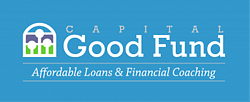Capital Good Fund loans are cheaper alternatives to payday loans. These loans can help you cover expenses for emergencies, immigration and home weatherization.



12.00 - 15.99%
None
3 days
$300 - $50K
1 to 7 years
Capital Good Fund is an online, nonprofit lender that makes installment loans to borrowers with low incomes and no credit history or bad credit. Common uses of Capital Good Fund loans include car repairs, security deposits, refinancing high-interest debt, home weatherization and catching up on rent or utility bills.
With rates capped at 18%, Capital Good Fund personal loans are cheaper than payday and other high-interest loans.
Capital Good Fund lends to consumers in 11 states: Colorado, Connecticut, Delaware, Florida, Georgia, Illinois, Massachusetts, New Jersey, Pennsylvania, Rhode Island and Texas.
The company says it can offer low rates to consumers because it partly operates on grants and donations.
Capital Good Fund offers several loan types, depending on what you need the funds for. Rates, terms and availability vary by state.
Loan | Amount | Est. APR | Repayment terms | States available |
|---|---|---|---|---|
Impact | $300 - $1,500 ($500 maximum in RI). | 5% - 18% (varies by state). | 15 months. | CT, FL, GA, NJ, RI and TX. |
Immigration | $1,501 - $20,000. | 15.99%. | 4 years. | CO, CT, DE, FL, GA, IL, MA, NJ, PA, RI and TX. |
Weatherization | $500 - $50,000. | 0% - 5.99%. | 2 to 7 years. | MA and RI. |
Impact loans can be used for meeting basic needs like paying rent or covering surprise expenses, such as medical bills or car repairs.
In addition to smaller Impact loans, the lender offers an Impact PLUS loan in Georgia. Loans are from $1,501 to $3,500 with a 5% APR and are repaid over 30 months.
» MORE: Compare emergency loans
These loans can pay for immigration-related expenses, such as obtaining citizenship and securing or renewing a green card. The lender says it has staffers who are fluent in English and Spanish.
Special requirements: Borrowers need a referral from a community agency or immigration attorney proving they’re eligible for immigration to get this loan. If the loan is used to pay for a detention bond, Capital Good Fund requires a copy of the judge’s immigration order.
The lender offers two types of weatherization loans to help homeowners in Massachusetts and Rhode Island make their houses more energy-efficient:
Special requirements: Borrowers need a state-issued HEAT Loan Authorization Form and a household income of less than $140,000 in order to apply for a DoubleGreen loan. You’ll need your contractor to submit a project verification form to apply for a HomeGreen loan.
To qualify for a Capital Good Fund loan, you usually need a bank account or prepaid debit card with two or more months of statements, and income that can be verified with pay stubs or deposits into a bank account. You also must live in one of the states where Capital Good Fund operates.
Those qualifications are in addition to any special requirements for the type of loan you’re getting.
Banking history and a borrower’s ability to repay the loan are among the most important factors considered for approval. The company looks at your bank account history and whether you’re up to date on financial obligations like your mortgage and child support payments. This information shows not only if a borrower has enough income to repay the loan, but whether they keep enough money in their account every month to do so.
You don’t need a credit score or credit history to get a loan, but any credit you have will be considered.
Capital Good Fund offers a credit-builder program in nine states, in which you pay $5 per month for 12 months. The lender reports those payments to all three credit bureaus as a 0% APR loan. It also offers a financial coaching program at $15 per month for 12 months.
» MORE: Get your free credit score through NerdWallet
Here’s what you can expect to pay for one of its loans:
» MORE: Use our personal loan calculator
Capital Good Fund has lower rates and smaller borrowing amounts than other payday loan alternatives, though lenders like Oportun and OppLoans are more widely available.
Oportun: Offers personal loans up to $10,000 with APRs up to about 36%. Oportun allows borrowers to choose their payment date or add a co-borrower.
OppLoans: Offers installment loans up to $5,000 with triple-digit APRs. OppLoans may let you change your payment date.
Here are some alternatives that may be cheaper than borrowing.
For help meeting basic needs: Find a local financial assistance program that can help you get food, clothing and access to transportation for job interviews.
For help with rent or utilities: Contact your utility company, landlord or mortgage issuer for help deferring a payment. If you need long-term help, consider seeking other housing, or contact a housing counselor.
To pay medical bills: Learn about ways to cover medical costs, including payment plans.
To cover other one-time emergency expenses:
» MORE: Explore alternatives to payday loans
After considering alternatives, you may decide that taking a Capital Good Fund loan is your best option. In that case, do what you can to carve out room in your budget to repay the loan as quickly as possible and to build your emergency savings. For many people, borrowing for emergencies can be an expensive solution.
 | |||
|---|---|---|---|
EST. APR 12.00-15.99% | EST. APR 7.74-35.49% | EST. APR 6.53-35.99% | EST. APR 7.74-35.99% |
LOAN AMOUNT $300-$50K | LOAN AMOUNT $5K-$100K | LOAN AMOUNT $1K-$60K | LOAN AMOUNT $1K-$50K |
MIN. CREDIT SCORE None | MIN. CREDIT SCORE None | MIN. CREDIT SCORE 600 | MIN. CREDIT SCORE 600 |